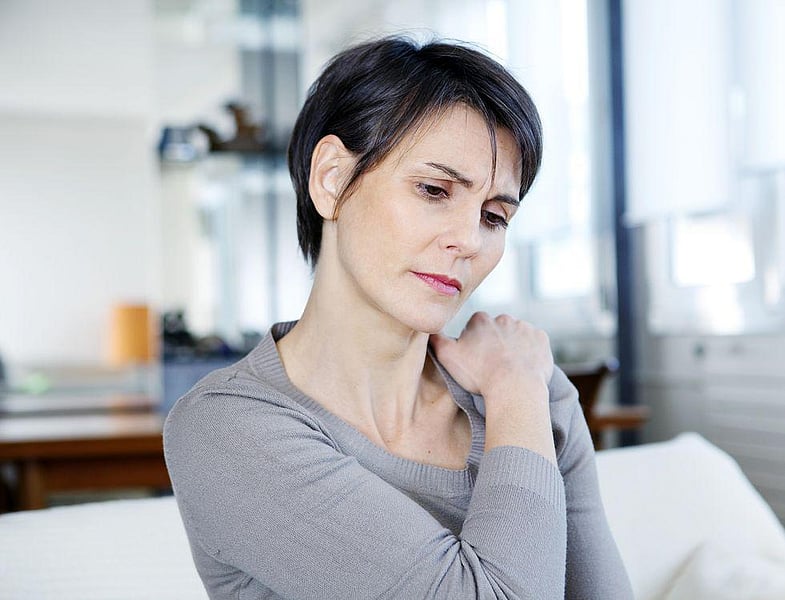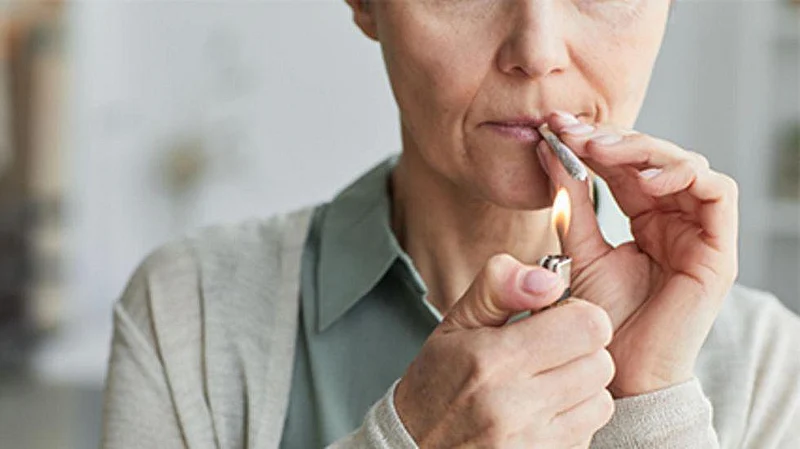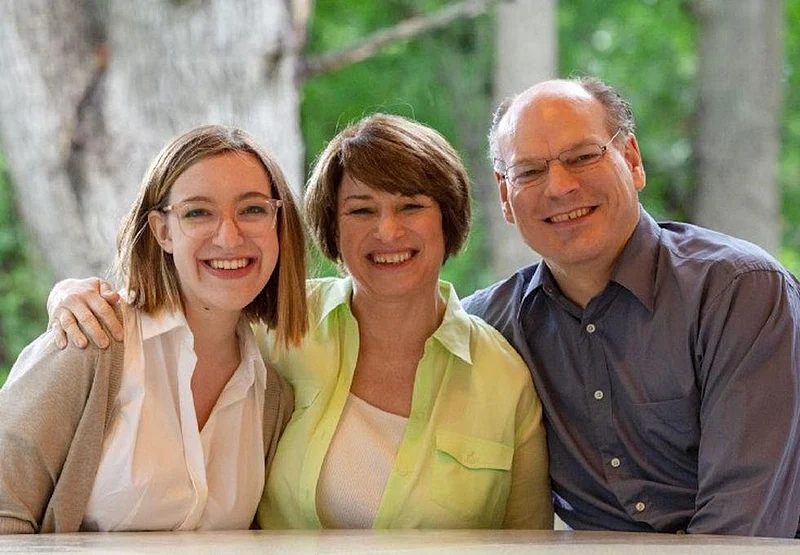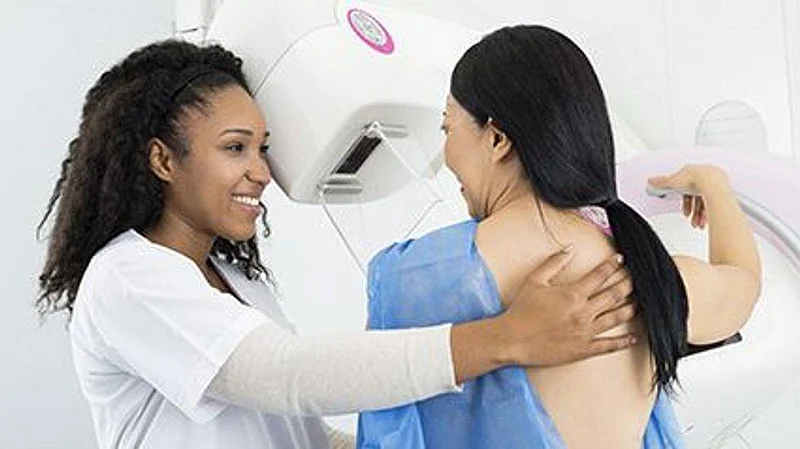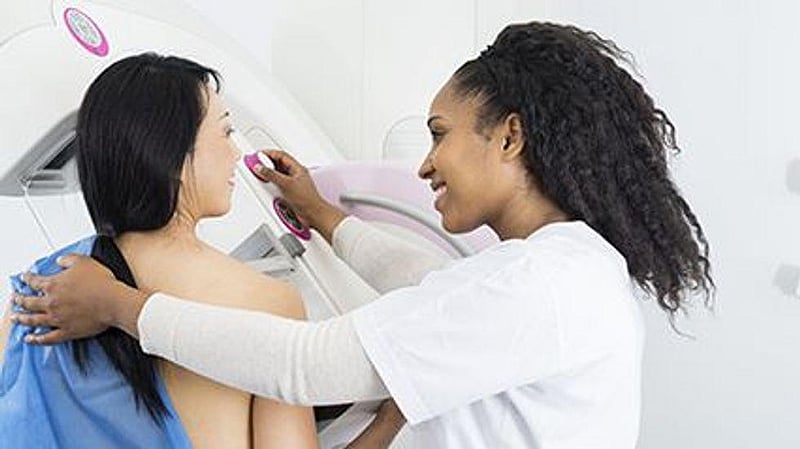Get Healthy!
348 Results for search "Cancer: Breast".
Health News Results - 348
Arm and shoulder pain are common for women after breast cancer surgery, and beginning a supervised exercise program soon afterwards can go a long way to easing the discomfort, new research suggests.
As the team of British investigators explained, restricted shoulder movement and chronic pain or swelling in the armpit area can really impact a patient's recovery and quality of life.
...
- Ernie Mundell and Robert Preidt
- |
- November 12, 2021
- |
- Full Page
It's a life-and-death prediction: How likely is early-stage breast cancer to spread throughout the rest of a patient's body?
A new analysis that tried to make that call easier for doctors to predict found that a younger age at diagnosis was a strong indicator of spreading ("metastatic") cancer.
To come to that conclusion, the researchers analyzed data from tens of thousands of women...
- Robert Preidt
- |
- November 3, 2021
- |
- Full Page
High-dose radiation therapy may stall tumor growth in patients with advanced lung cancer who are not fully responding to drug therapies, a preliminary study suggests.
The study involved patients whose lung cancer was considered "oligoprogressive." That means the cancer had spread to other sites in the body, and the patients were having a mixed response to standard systemic treatments -- i...
- Amy Norton HealthDay Reporter
- |
- October 26, 2021
- |
- Full Page
American cancer patients spent more than $21 billion on their care in 2019, a new report shows.
That $21.09 billion included out-of-pocket costs of $16.22 billion and patient time costs of $4.87 billion. Patient time costs are the value of the time patients spend traveling for, waiting for and receiving care.
"As the costs of cancer treatment continue to rise, greater attention to a...
- |
- October 26, 2021
- |
- Full Page
Researchers may have found a noninvasive way to temporarily open the brain's borders to allow tumor-fighting medication inside.
By necessity, the brain is shielded by a layer of specialized cells called the blood-brain barrier. Its job is to allow needed substances in -- like oxygen and sugar -- while keeping out substances that could be toxic.
Unfortunately, that means medications ...
- Amy Norton HealthDay Reporter
- |
- October 18, 2021
- |
- Full Page
When Brooklyn-based mom and fashion designer Suzanne Weiner began treatment for breast cancer three years ago, her medical marijuana card was her best friend.
"Pot helped me tremendously with the anxiety and stress of my diagnosis," she said. "I was a mess." Weiner still smokes marijuana regularly to help lessen the side effects of an ongoing treatment that helps keep her cancer at bay.
- Denise Mann HealthDay Reporter
- |
- October 13, 2021
- |
- Full Page
Private insurers paid out about $156.2 billion in 2018 for U.S. patients with the 15 most common cancers.
Medication was the largest expense and drugs for breast, lung, lymphoma and colon cancers accounted for the largest chunk of those costs, according to a Penn State College of Medicine study.
"The public often hears that the U.S. spends an inordinate amount of money on health car...
- Robert Preidt
- |
- October 13, 2021
- |
- Full Page
Patients who undergo surgery for certain types of cancer may have better short-term survival if they receive a particular anti-nausea drug, a preliminary study suggests.
Among more than 74,000 patients who had cancer surgery, researchers found that those who received the drug -- called dexamethasone -- were less likely to die in the next 90 days.
The vast majority of all patients su...
- Amy Norton HealthDay Reporter
- |
- October 12, 2021
- |
- Full Page
A shift in thinking means it's OK to skip your monthly breast self-exam -- but don't miss your regular professional checkup and diagnostic imaging, health experts say.
A periodic visual check in a mirror can be helpful, breast health experts from the Cedars-Sinai health system in California suggest.
"Beginning at age 40, women with an average risk for breast cancer should rely on an...
- Cara Murez
- |
- October 7, 2021
- |
- Full Page
While mammograms have reduced deaths by detecting breast cancers when they're small and easier to treat, it's less effective for women with dense breasts.
However, a new study finds that supplemental MRI screening can make a difference for these women, who are more likely to develop breast cancer. And new technology is being used to speed the process.
Artificial intelligence ca...
- Cara Murez
- |
- October 6, 2021
- |
- Full Page
An artificial intelligence tool could help radiologists spot breast cancer on ultrasound images and reduce the need for extra testing, new research suggests.
"Our study demonstrates how artificial intelligence can help radiologists reading breast ultrasound exams to reveal only those that show real signs of breast cancer, and to avoid verification by biopsy in cases that turn out to be be...
- Cara Murez
- |
- September 24, 2021
- |
- Full Page
Hispanic people in the United States have lower cancer rates than white people, but they are much more likely to develop certain preventable cancers.
"The good news is that overall cancer rates are lower in Hispanic people, but we are seeing very high rates of infectious disease-related cancers, many of which are potentially avoidable," said study author Kimberly Miller, a scientist at th...
- Denise Mann HealthDay Reporter
- |
- September 23, 2021
- |
- Full Page
Younger women who undergo radiation for cancer in the left breast have a heightened risk of heart disease years later, a new study finds.
Among women who received radiation therapy for left-sided breast cancer, 10.5% developed coronary artery disease over the next 27 years, researchers found. That was close to double the rate among women who had radiation for tumors in the right breast.
- Amy Norton HealthDay Reporter
- |
- September 22, 2021
- |
- Full Page
New research offers good news for women with an aggressive HER2-positive breast cancer.
A targeted therapy, trastuzumab deruxtecan (T-DXd), sold as Enhertu, triples the length of time that the cancer remains in check when compared with the current gold standard, trastuzumab emtansine (T-DM1).
Both of these drugs are second-line treatment options for HER2-positive breast cancer that ...
- Denise Mann HealthDay Reporter
- |
- September 20, 2021
- |
- Full Page
When Nancy Cappello was diagnosed with advanced breast cancer in 2003, she was stunned.
How could this have happened? She went for her annual screening mammogram every year and was always told that all was fine.
It wasn't.
Cappello had dense breasts, but no one had ever told her. "The tumor was likely growing for five to seven years," said her husband, Joseph Cappello. "At the...
- Denise Mann HealthDay Reporter
- |
- September 13, 2021
- |
- Full Page
U.S. Sen. Amy Klobuchar revealed Thursday that she's been treated for early-stage breast cancer, including surgery to remove a lump and radiation therapy.
The 61-year-old Minnesota Democrat said in a statement posted on social media that Mayo Clinic doctors found worrying signs...
- Dennis Thompson
- |
- September 9, 2021
- |
- Full Page
Radiologists still outperform artificial intelligence (AI) when it comes to breast cancer screening, a new paper shows.
Many countries have mammography screening programs to detect and treat breast cancer early. However, examining mammograms for early signs of cancer means a lot of repetitive work for radiologists, which can result in some cancers being missed, the authors explained.
<...- Robert Preidt
- |
- September 3, 2021
- |
- Full Page
Many parts of the United States saw a significant drop in breast cancer screening of older low-income women during the COVID-19 pandemic, new research shows.
The analysis of data from 32 community health centers that serve low-income people found that breast cancer screening for 50- to 74-year-old women dropped 8% between July 2019 and July 2020. That wiped out an 18% increase between Jul...
- Robert Preidt
- |
- August 31, 2021
- |
- Full Page
For breast cancer patients battling "chemo brain," regular exercise may be a powerful prescription, a new study suggests.
The term "chemo brain" refers to thinking and memory problems often experienced by patients who undergo chemotherapy.
It's "a growing clinical concern," said study first author Elizabeth Salerno, an assistant professor of surgery at Washington University School o...
- Robert Preidt
- |
- August 25, 2021
- |
- Full Page
Don't believe everything you read on social media about cancer and cancer treatment.
A new study finds that one-third of the most popular articles on social media about treatment for common cancers contains misinformation -- and most of it can be downright dangerous.
"The worst-case scenario is when it leads to a person declining proven cancer treatments in favor of a treatment tha...
- Denise Mann HealthDay Reporter
- |
- July 28, 2021
- |
- Full Page
The COVID-19 pandemic could leave a grim legacy for women's health.
New research suggests that disruptions in breast cancer screening and treatment in the United States during the COVID-19 pandemic could lead to an increase in deaths from the disease.
While mammography rates have accelerated in 2021, "facilities should prioritize screening women who missed their routine mammography ...
- Ernie Mundell and Robert Preidt HealthDay Reporters
- |
- July 14, 2021
- |
- Full Page
A major U.S. hospital system had a strong rebound in most cancer screening tests after a steep drop-off in the early months of the COVID-19 pandemic, a new study shows.
The findings are based on an analysis of data from the Boston-based Mass General Brigham system. Depending on the type of test, between March and June of 2020, the number of cancer screenings dropped off between 65% a...
- Robert Preidt
- |
- July 12, 2021
- |
- Full Page
Americans' overall death rate from cancer continues to fall -- but rising rates of certain cancers and ongoing racial disparities linger.
Those are among the findings of an annual report to the nation from several major cancer organizations.
The good news includes an accelerating decline in the overall cancer death rate, among both women and men, and across racial and ethnic groups....
- Amy Norton HealthDay Reporter
- |
- July 8, 2021
- |
- Full Page
Racial disparities in breast cancer survival have narrowed in recent years, but Black women with the disease still have double the death rate of white women.
That's according to a study that tracked breast cancer trends in Florida between 1990 and 2015. Overall, deaths from the disease declined among Black, Hispanic and white women alike -- with the improvement being greater among minorit...
- Amy Norton HealthDay Reporter
- |
- July 2, 2021
- |
- Full Page
Breast and cervical cancer screenings dropped sharply among low-income minority women during the COVID-19 pandemic, the U.S. Centers for Disease Control and Prevention says.
That could lead to delayed cancer diagnoses, health consequences and an increase in existing disparities, the agency warned.
The new findings "reinforce the need to safely maintain routine health care services d...
- Robert Preidt
- |
- June 30, 2021
- |
- Full Page
Could a new one-and-done blood test designed to detect as many as 50 different types of cancer become a diagnostic game changer?
Yes, say researchers, who report the method appears accurate and reliable at identifying and locating cancer, including some kinds for which there are now no effective screening methods.
"[The test] sets the stage for a new paradigm of screening individual...
- Alan Mozes HealthDay Reporter
- |
- June 25, 2021
- |
- Full Page
Many people with heart failure take a cholesterol-lowering statin, and new research suggests those pills might also lower their odds for cancer.
Researchers analyzed data from more than 87,000 people in Hong Kong who had no history of cancer and were hospitalized for heart failure between 2003 and 2015.
They were followed until they were diagnosed with cancer, died or until the end ...
- Ernie Mundell and Robert Preidt HealthDay Reporters
- |
- June 24, 2021
- |
- Full Page
Women battling infertility are often given medications to help them conceive, and potential side effects are always a concern. Now, research suggests use of the drugs won't raise a woman's odds for breast cancer.
Researchers at King's College London in the United Kingdom analyzed studies from 1990 to January 2020 that included 1.8 million women of all reproductive ages who underwent ferti...
- Robert Preidt
- |
- June 23, 2021
- |
- Full Page
Rates of breast cancer-related genetic mutations in Black and white women are the same, according to a new study that contradicts previous research.
It found that about 5% of both groups of women have a genetic mutation that increases the risk of breast cancer.
"The findings challenge past, smaller studies that found Black women face a greater genetic risk and the suggestion th...
- Robert Preidt
- |
- June 15, 2021
- |
- Full Page
Breast cancer patients who have adequate levels of vitamin D - the "sunshine vitamin" - at the time of their diagnosis have better long-term outcomes, a new study finds.
Combined with the results of prior research, the new findings suggest "an ongoing benefit for patients who maintain sufficient levels [of vitamin D] through and beyond breast cancer treatment," said study lead author Son...
- Ernie Mundell and Robert Preidt HealthDay Reporters
- |
- June 10, 2021
- |
- Full Page
Women whose diets tend to feed inflammation may have a heightened risk of breast cancer, a preliminary study suggests.
The study, of more than 350,000 women, found that the more "pro-inflammatory" foods women consumed, the higher their breast cancer risk.
The term refers to foods thought to contribute to chronic low-grade inflammation throughout the body - a state implicated in vari...
- Amy Norton HealthDay Reporter
- |
- June 7, 2021
- |
- Full Page
After a diagnosis of breast cancer, Black women face a greater risk of having the disease spread to distant sites in the body - a disparity that is not readily explained, researchers say.
It's known that in the United States, Black women have the highest death rates from breast cancer of any racial or ethnic group.
Compared with white women, Black women are 40% more likely to die of...
- Amy Norton HealthDay Reporter
- |
- June 4, 2021
- |
- Full Page
A twice-daily pill can dramatically reduce the risk of breast cancer recurrence in women who are genetically prone to the disease, researchers report.
The pill - olaparib (Lynparza) - works by blocking a natural enzyme called PARP that normally fixes DNA damage in healthy cells, but in these women actually promotes the growth of cancerous cells.
Early high-risk breast cancer patient...
- Dennis Thompson HealthDay Reporter
- |
- June 4, 2021
- |
- Full Page
Moderate use of hair relaxers doesn't increase a Black woman's risk of breast cancer, according to a new study.
"While there is biologic plausibility that exposure to some components contained in hair relaxers might increase breast cancer risk, the evidence from epidemiologic studies to date continues to be inconsistent," said lead author Kimberly Bertrand, an epidemiologist and assistant...
- Robert Preidt
- |
- May 26, 2021
- |
- Full Page
There was a sharp drop in mammography breast cancer screening during the COVID-19 pandemic, and the decline was especially severe among American women of color and those living in rural areas, new research shows.
Those trends could cost lives in years to come, because "detecting breast cancer at an early stage dramatically increases the chances that treatment will be successful," said stu...
- |
- May 24, 2021
- |
- Full Page
Early in the pandemic, some were concerned that breast cancer treatments that weaken the immune system might increase a person's risk of catching or dying from COVID-19.
Now, new research shows that women who have these treatments are no more likely to become sick from the novel coronavirus or to die from it than women being treated with other cancer treatments that do not weaken immune d...
- Cara Murez
- |
- May 20, 2021
- |
- Full Page
There's some reassuring news for women with multiple sclerosis (MS): Having the neurological disease won't affect health outcomes if breast cancer strikes.
"Although multiple sclerosis and its complications remain the most common cause of death in people with MS, cancer is the second or third most common cause of death," noted study lead author Dr. Ruth Ann Marrie, of the University of M...
- |
- May 19, 2021
- |
- Full Page
More lower-income Americans are surviving cancer due to expanded Medicaid health care coverage, a new study shows.
Researchers found a link between long-term survival of patients newly diagnosed with cancer -- across all stages and types of the disease -- and expanded Medicaid income eligibility. In other words, survival odds improved in states that granted Medicaid coverage at high...
- |
- May 19, 2021
- |
- Full Page
People with heart failure are 20% more likely than those with cancer to develop depression within five years of their diagnosis, a new study finds.
Nearly 1 in 4 patients with heart failure are depressed or anxious, according to the German researchers.
"The treatment of mental illnesses in cancer patients -- psycho-oncology -- is long-established, but similar services for heart pati...
- Steven Reinberg
- |
- May 14, 2021
- |
- Full Page
Being obese or overweight can increase the odds of developing several types of cancers, new research from the United Kingdom reveals.
But shedding the excess pounds can lower the risk, researchers say.
Reducing obesity cuts the risk for endometrial cancer by 44% and uterine cancer by 39%, and could also prevent 18% of kidney cancers and 17% of stomach and liver cancers, according t...
- Steven Reinberg HealthDay Reporter
- |
- May 10, 2021
- |
- Full Page
Nearly 10 million cancer screenings have been missed in the United States during the coronavirus pandemic, researchers report.
The investigators analyzed data on three types of cancer for which early screenings are most beneficial -- breast, colon and prostate -- and found that 9.4 million screenings for these cancers did not occur in the United States due to COVID-19.
Screenings fo...
- Robert Preidt
- |
- May 5, 2021
- |
- Full Page
A first-of-its-kind study suggests that slow-growing breast cancers can be treated with a highly targeted tumor-freezing technique, eliminating the need for invasive surgery.
Testing to date suggests that the technique is effective among women over 60 diagnosed with relatively low-risk breast cancer.
"Cryoablation is a minimally invasive solution that destroys breast tumors sa...
- Alan Mozes HealthDay Reporter
- |
- May 4, 2021
- |
- Full Page
As the COVID-19 pandemic unfolded, breast cancer experts realized space in operating rooms and hospitals could become scarce. That meant rethinking standard care, to provide the best way to treat patients under these suddenly restricted conditions.
One of the new ideas: Reverse the order of care given to patients with a type of breast cancer known as estrogen receptor-positive (ER+). ER+ ...
- Cara Murez HealthDay Reporter
- |
- May 4, 2021
- |
- Full Page
Breast reconstruction rates rose significantly among Black women after Obamacare expanded access to Medicaid, a new study says.
It also found a large increase in reconstruction rates among women with lower income and education levels.
The findings suggest "that Medicaid expansion was highly effective in doing what it was supposed to do -- breaking down barriers to care," said lead r...
- Robert Preidt
- |
- May 3, 2021
- |
- Full Page
If hormones are part of your treatment for breast or prostate cancer, your heart health should be closely monitored, according to a new American Heart Association scientific statement.
Hormonal therapies for breast and prostate cancer increase the risk of heart attack and stroke, the authors noted. This increased risk is greater in patients who already have two or more heart risk factors...
- Robert Preidt
- |
- April 26, 2021
- |
- Full Page
Many women older than 70 can safely receive fewer treatments for early-stage breast cancer, a new study suggests.
Researchers found that adding lymph node removal or radiation to women's treatment did not seem to cut their risk of a breast cancer recurrence, which was low overall.
The findings, experts said, support existing recommendations to "de-escalate" those procedures for many...
- Amy Norton HealthDay Reporter
- |
- April 20, 2021
- |
- Full Page
Most people know obesity can lead to diabetes or heart disease, but excess weight can play a role in cancer, too, researchers say.
A new study found that breast cancer survivors who are overweight have a statistically significant increased risk of developing a second primary cancer - one not connected to their previous cancer.
The risk likely owes to shared risk factors between the ...
- Cara Murez HealthDay Reporter
- |
- April 19, 2021
- |
- Full Page
A long-banned pesticide may be having health effects that ripple across generations, a new study suggests.
At issue is DDT, a once widely used pesticide that was banned in the United States in 1972. That ban, however, was not the end of the story.
DDT is a persistent organic pollutant, a group of chemicals that are slow to break down and linger in the environment for years. So ...
- |
- April 14, 2021
- |
- Full Page
Marc Baum went through all the usual steps to treat his bladder cancer -- a couple of surgeries, radiation therapy and chemotherapy, all in a three-month period.
But doctors hope that an extra step -- an experimental vaccine -- will be what keeps Baum's cancer from coming back.
A vaccine that uses genetics to teach a person's immune system how to precisely target the cancer has prov...
- Dennis Thompson HealthDay Reporter
- |
- April 13, 2021
- |
- Full Page
At first glance, it appears that little will change between now and 2040 when it comes to the types of cancers that people develop and that kill them, a new forecast shows.
Breast, melanoma, lung and colon cancers are expected to be the most common types of cancers in the United States, and patients die most often from lung, pancreatic, liver and colorectal cancers, according to the lates...
- Dennis Thompson HealthDay Reporter
- |
- April 8, 2021
- |
- Full Page

